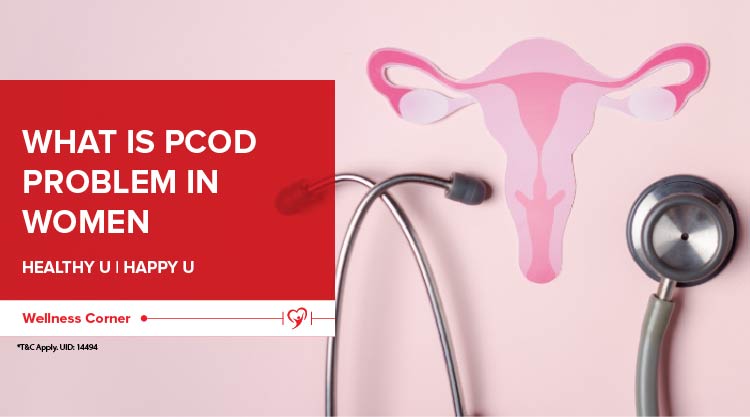

Understanding PCOD: Causes and Management
- Overview
- Causes
- Symptoms
- How PCOD affects your body
- Diagnosis
- Myths
- Treatment
- Management
- Prevention Tips
- When to see a doctor
- Difference between PCOD and PCOS
- FAQs
What is PCOD?
Polycystic Ovarian Disease (PCOD) is a common hormonal disorder affecting around 10-15% of women across the globe. Ovaries are the reproductive organs that help regulate the menstrual cycle. PCOD affects the ovaries and this medical condition disrupts a woman’s normal fertility cycle. As a result of this disorder, eggs produced by ovaries are either immature or partially mature; these eggs can become cysts in ovaries. PCOD is characterised by irregular or absent periods, excess hair growth, weight gain, and excess androgen (male hormones) levels that lead to infertility. There are treatments available to manage these symptoms.
Causes of PCOD
The exact causes are still not known but there are some factors which can cause PCOD —
1. Genetic
Those with a family history of PCOD are more likely to develop this condition. If PCOD runs in your family, you have a high chance of suffering from this hormonal disorder.
2. Inflammation
Low-grade inflammation increases androgen (male hormones) levels. This, in turn, causes PCOD. Inflammation can be due to autoimmune diseases.
3. Excess male hormones
When ovaries produce excess male hormones or androgen, it disturbs the ovulation process. Abnormally high androgen levels cause excessive hair growth on the face and body.
4. Excess insulin
Insulin, produced in the pancreas, helps regulate blood sugar levels and metabolic functions of the body. When our body cells become insulin-resistant, the blood sugar level rises. Our body makes more insulin to control or reduce the blood sugar level. This excess production of insulin leads to the overproduction of male hormones, thereby impacting ovulation.
5. Lifestyle
Poor lifestyle habits, such as unhealthy diet, sedentary lifestyle, smoking, excessive drinking, etc., can lead to hormonal changes causing PCOD.
6. Obesity
If you are obese/overweight, you are more likely to have PCOD.
Symptoms
Some common symptoms of PCOD are listed below.
- Periods are irregular: One of the most common symptoms is irregular or missed periods. For instance, you can have less than nine periods a year or no periods at all due to a lack of ovulation.
- Heavy bleeding: Due to irregular periods, the uterine lining builds up leading to heavy bleeding.
- Excess hair growth: Those with PCOD have excess hair growth on their face and body, including chest, belly, and back.
- Acne: PCOD can cause acne, especially on the back, face, and chest.
- Weight gain: Most women with PCOD are overweight, suffer from obesity or have trouble losing weight.
- Skin darkening: Dark skin patches appear under the arms or breasts, on the neck and groin region.
- Hair loss or thinning: Male pattern baldness, like losing patches of hair on the head, is also a symptom of PCOD.
How PCOD affects your body
If you have PCOD, it can affect your body in many ways, such as —
- Infertility: A woman needs to ovulate regularly to conceive. Those with PCOD have poor ovulation, making them infertile, or they have difficulty getting pregnant.
- Metabolic syndrome: This refers to a cluster of factors, like hypertension, high blood sugar, and high cholesterol levels, which increase the risk of stroke, diabetes, or heart attack.
- Endometrial cancer: Thickening of the uterine lining can cause endometrial cancer or cancer of the uterus. The uterine lining builds up due to poor ovulation.
- Sleep apnoea: This is a condition where your breathing stops and starts many times during sleep.
- Depression: Hormonal imbalance and symptoms such as facial hair and abnormal hair growth on the body can cause anxiety and depression.
How is PCOD diagnosed?
If your doctor suspects PCOD based on your signs and symptoms, you will be asked to undergo certain tests for a proper diagnosis of the condition, such as blood tests, pelvic exam, and ultrasound. Blood tests will measure your hormone levels, glucose tolerance, triglyceride levels, and cholesterol. A pelvic exam is done to check if your reproductive organs have any masses, growths, or abnormalities. Ultrasound will check the size of the ovaries and thickening of the uterus lining or if there are any cysts in the ovaries.
Your doctor may also suggest screening tests for depression, anxiety, and sleep apnoea. You will also be asked to periodically monitor your glucose tolerance, blood pressure, triglyceride, and cholesterol levels.
Myths about PCOD
Some common myths about PCOD are —
Myth 1. If it’s irregular periods, it’s PCOD
Irregular periods can be due to several reasons like hormonal changes, breastfeeding, fibroid in the uterus, or pelvic inflammatory condition. So, it’s wrong to link irregular periods with PCOD or PCOS and advisable to get tested to know the exact cause behind irregular periods.
Myth 2. PCOD affects only overweight/obese women
It’s true that most women who have PCOD are overweight, but lean people are not spared altogether. Even those with normal weight can get diagnosed with PCOD due to insulin resistance or hormonal changes.
Myth 3. Women with PCOD cannot conceive
Not true. Women diagnosed with PCOD have difficulty with ovulation, but that doesn’t mean they cannot conceive. In order to increase your chances of conceiving, doctors advise following good lifestyle habits, such as eating right, exercising regularly, getting adequate sleep, and avoiding stressful situations.
Myth 4. PCOD causes weight gain
This is not true. On the contrary, weight gain causes PCOD. If a woman has excess fat in her body, it leads to production of androgen or male hormones, which, in turn, causes irregular periods and other hormonal changes.
Myth 5. Losing weight may help treat PCOD
Since several factors cause PCOD, just losing weight cannot treat it. Medication and lifestyle changes are required to manage PCOD.
Treatment Options
Treatment will be based on your symptoms, medical history, and whether you plan to get pregnant in the future. The options include medications, lifestyle modifications or a combination of both.
1. Medication
You will be treated for irregular periods, infertility, excessive production of androgen or male hormones, poor ovulation, excessive hair growth on the face and body, hair loss, acne, and obesity. For those who don’t plan to get pregnant, medications include birth control pills, insulin-sensitising medicine to treat diabetes, and medicines to block androgens. For women who want to get pregnant now or in the future, gynaecologists prescribe medications to induce ovulation, surgery to remove tissues from ovaries that produce male hormones, or undergoing IVF procedure in cases where medications don’t improve ovulation.
2. Lifestyle Changes
A healthy diet, especially low-carb food intake, combined with regular physical activity, can help in treating PCOD. It can help your body to use insulin efficiently, maintain blood sugar levels and weight, and may help in ovulation. Include lot of fruits and vegetables, whole foods, chicken, fish, and lean meat in your diet. Since most women coping with PCOD are overweight, losing even 5-10% of weight can improve their condition and regulate the menstrual cycle. Staying physically active may also keep your weight under control. If you need a specific diet plan, your doctor can help you with a weight-loss regime and diet chart.
Management
The following steps can help manage PCOD.
- Maintaining a healthy weight: This can reduce insulin and androgen levels and help restore ovulation. It can also lower the risk of cardiac disease, diabetes, and high blood pressure. A BMI of 18.5-24.9 is ideal, and more than 30 is considered obese.
- Limit carbohydrates: Follow a low-carb or complex carbohydrate diet to maintain insulin level. Eat fruits, vegetables, whole grains, fish, meat, natural fats like pumpkin seeds, sunflower seeds, sesame seeds, etc. Avoid sugar and starchy foods like bread, potatoes, rice, pasta, and beans.
- Regular exercise: If you have PCOD, you must exercise regularly and be active to keep your blood sugar levels and weight under control. Exercise helps in lowering and controlling blood sugar levels.
Prevention Tips
Here are some tips to reduce the risk of having PCOD:
- Eating a balanced diet and regular exercising can help maintain a healthy weight which in turn can help regulate your menstrual cycle, lower insulin resistance and reduce your risk of getting PCOD. If you are obese or overweight, it can increase your insulin levels, which, in turn, increases the production of androgen or male hormones, causing PCOD.
- Good sleep can help prevent PCOD. Maintain a regular bedtime routine, make sure you sleep for a good 8-10 hours at night, and avoid stimulants and fatty foods before going to bed.
- Reduce stress levels with yoga, meditation and proper sleep, and by reducing caffeine intake.
When to see a doctor
Consult a medical practitioner if you experience any signs and symptoms of PCOD, such as irregular or missed periods (unless you are pregnant), acne, unwanted hair growth on the face and body, unexplained weight gain or loss, hair loss or thinning, dark skin patches under the arms, breast, neck, or groin region. You may also have symptoms of diabetes, such as excessive hunger or thirst, weight loss, etc. It’s also recommended to see a doctor if you have difficulty getting pregnant. Timely treatment can help manage PCOD.
Difference between PCOD and PCOS
Although PCOD and PCOS may sound similar, there are some differences between the two conditions:
| PCOD | PCOS |
| PCOD is a common hormonal disorder affecting one-third of women globally. | PCOS is not common but not rare also. It affects only 0.2-2.5% of women worldwide. |
| In PCOD, the ovaries produce many immature or partially mature eggs, leading to cysts. | PCOS is a more severe condition in which ovaries produce excess male hormones, leading to anovulation. The ovaries stop releasing eggs. |
| PCOD doesn’t cause any severe complications. | PCOS can cause Type 2 diabetes, cardiac ailments, high blood pressure, obesity, and endometrial cancer. |
| PCOD doesn’t affect fertility in women. With some precautions and medical intervention, women can become pregnant. | It’s difficult for women with PCOS to become pregnant as they cannot ovulate regularly. Even if they conceive, there are chances of premature birth, miscarriage, or complications during pregnancy. |
| PCOD can be treated with a proper diet plan and lifestyle changes. | Women coping with PCOS may require infertility treatment and other treatments to manage any complications that may develop. |
| There are mild to moderate symptoms, which can be managed with medications, diet, and lifestyle modifications. | Symptoms of PCOS are severe, with women struggling from a young age. |
FAQs
1. Is PCOD a serious problem?
PCOD is a common hormonal disorder which can be managed with lifestyle changes and may not require medications. However, if left untreated, it can lead to severe health conditions, such as diabetes, infertility, hypertension, and cardiac ailments. So, if you experience any symptoms of PCOD, consult a doctor immediately.
2. Can a PCOD girl get pregnant?
Yes, a girl with PCOD can get pregnant though she may have little difficulty in conceiving. To increase her chances of pregnancy, doctors may recommend treatment options like in vitro fertilisation (IVF), medicines to induce ovulation, or surgery to remove tissues from ovaries that produce male organs.
3. Are PCOD and PCOS the same?
No. PCOD is a common hormonal disorder in which the ovaries produce immature or partially mature eggs due to hormonal imbalance, obesity, poor lifestyle, etc., and doesn’t affect fertility in women. PCOS, on the other hand, is a severe condition where the ovaries produce excess male hormones, causing infertility. Those with PCOD usually don’t have any severe health complications, but PCOS patients can suffer from diabetes, high blood pressure, heart problems, etc.
4. Can PCOD be cured naturally?
PCOD cannot be cured but managed naturally with lifestyle modifications such as following a low-carb or complex carbohydrate diet, regular exercise, maintaining a healthy weight, staying active, and getting enough sleep.
5. Which is the best treatment for PCOD: homoeopathy, Ayurveda or allopathy?
There’s no complete cure for PCOD though it can be managed with lifestyle changes, proper medications, and natural remedies. Allopathy is the most commonly used treatment with medications to regulate irregular periods and reduce symptoms. It's better to follow your doctor's advice.
Source: healthline, hopkinsmedicine, timesofindia, my.clevelandclinic, maxhealthcare
Get a right Health Insurance today & protect your savings from unexpected medical expenses.
Disclaimer: This blog provides general information and discussions about health and related subjects. The information and other content provided in this blog, website or in any linked materials are not intended and should not be considered, or used as a substitute for, medical advice, diagnosis or treatment. Kindly contact your Doctor before starting a new medicine or health regime.

/diabetes_s.jpg)
/cholesterol-s.png)
/myocardial-infarction-s.jpg)
/cancer-w.png)
/obesity_s.jpg)












 Health Insurance
Health Insurance  Travel Insurance
Travel Insurance  Car Insurance
Car Insurance  Cyber Insurance
Cyber Insurance  Critical Illness Insurance
Critical Illness Insurance
 Pet Insurance
Pet Insurance
 Bike/Two Wheeler Insurance
Bike/Two Wheeler Insurance  Home Insurance
Home Insurance  Third Party Vehicle Ins.
Third Party Vehicle Ins.  Tractor Insurance
Tractor Insurance  Goods Carrying Vehicle Ins.
Goods Carrying Vehicle Ins.  Passenger Carrying Vehicle Ins.
Passenger Carrying Vehicle Ins.  Compulsory Personal Accident Insurance
Compulsory Personal Accident Insurance  Travel Insurance
Travel Insurance  Rural
Rural 










